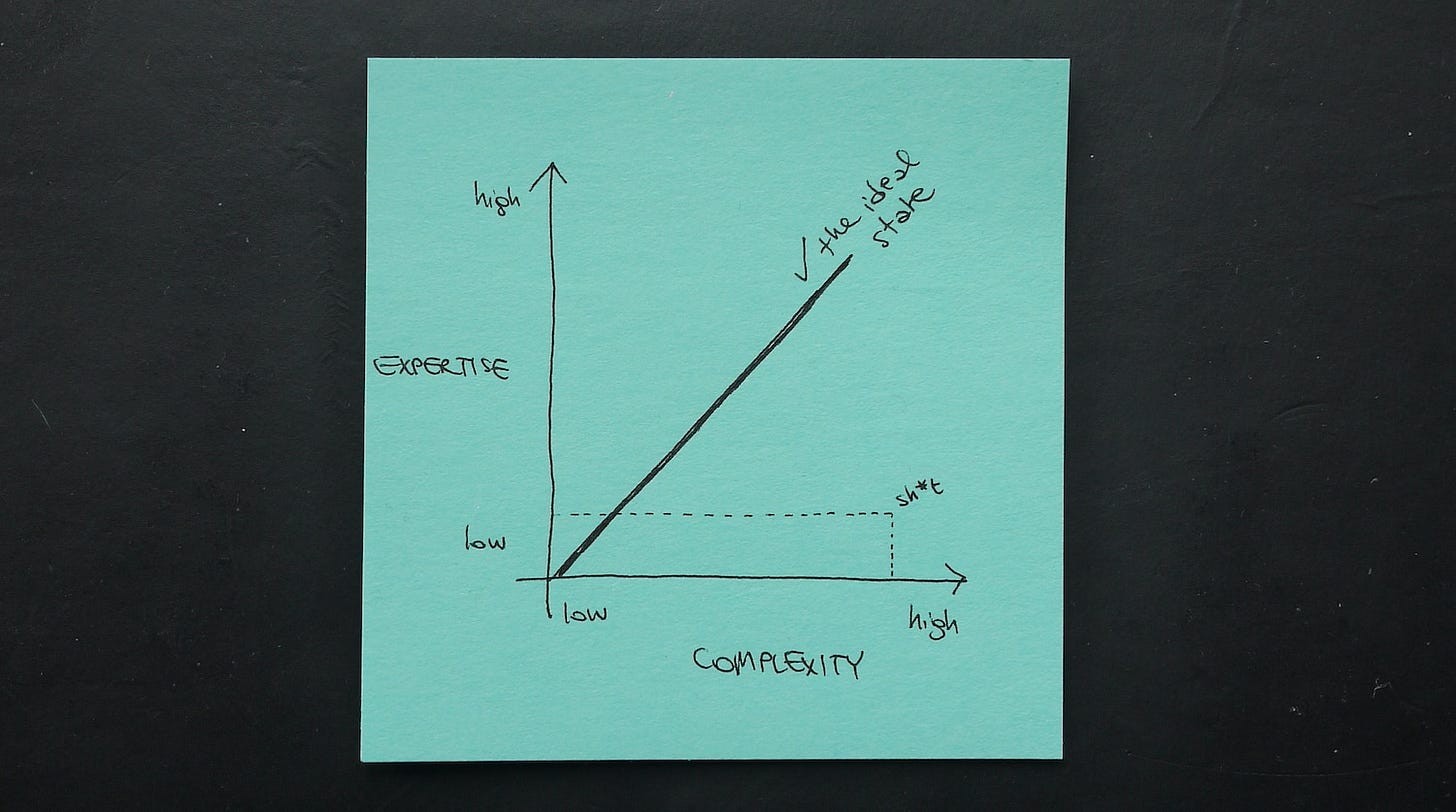You are reading contentfolks—a fortnightly blend of sticky notes, big content ideas, and small practical examples. Thank you for being here! ~fio
Hey there 👋
If you are not already doing it, interviewing experts is one of the key skills you need to master in the next 6 months.
Knowing how to run interviews has always been a valuable (and very under-appreciated) marketing skill, but it’s becoming more urgent given both Google’s updated quality guidelines1 and the proliferation of machine-generated content. Evidence of human expertise will become a differentiating factor in content—so you should regularly interview customers and subject matter experts like journalists would, then structure your plans and production around the unique facts, stats, and insight you just sourced.
The expertise/complexity system
The ideal way to create useful, helpful, and convincing content about anything is to match topical complexity with subject matter expertise, like this:
But you know as well as I do that we often find ourselves on the medium-to-high complexity side of a topic without a matching level of expertise, which is the dangerous sh*t point you see sketched on the graph above.
For example: having never even wondered how emails get delivered, at Postmark I couldn’t possibly plan or execute convincing content around email deliverability or authentication on my own, nevermind persuade a deeply technical audience to sign up for our product. I could obviously piece a lot of things together through independent research and googling, but so could any of our competitors; the distinctive element came from talking to deliverability experts who shared verifiable information, tangible data points, and unique opinions,2 and using interview transcripts as the foundation for both strategy and execution.
Of course, this took weeks as opposed to the 2.5 minutes it takes to type a “write a blog post about email deliverability, what it is and why people should care about it” prompt and watch ChatGPT do its thing.3 But just so we’re all on the same page, AI-generating tools do not replace subject matter expertise. They can, at best, remix several strands of individual expertise and roll them into convenient 200-word paragraphs… which still need to be checked by an expert anyway, because if you don’t know a topic well you sure cannot judge whether AI-generated text about it is factually correct.4
22 interview questions to get started
There are two main types of experts you’ll want to interview:
Subject matter experts → i.e. folks who have first-hand experience of the topics you’re covering, for example operations managers if you’re working in the resource management and capacity planning space, or ecommerce entrepreneurs if you’re talking about logistics and shipping
Product experts → i.e. power users of any software, service, or product that you are not yourself a proficient user of, who can describe and quantify pain points, jobs to be done, and feature success or failure in a way you just can’t
Being a good interviewer requires practice and repetition—I ran my first user interview in 2015, and while I’m no longer as terrified as I was then, I still occasionally get nervous before getting on a Zoom call 😅 It helps to have a general idea of what you want to cover, so here are some of my go-to questions.
Ask the subject matter expert:
Why is [topic] important? Why should a specific audience care?
How would you define [topic] for a beginner?
And how do you talk about [topic] to your peers?
What’s something non-experts believe about [topic] that they’re wrong about?
What’s the most common reason people struggle with [topic]?
How do you overcome the most common [topic] roadblocks or pain points?
Take me through the steps you take to do [example]. How do you know where to start? How do you know when you’re done?
What is the one action you’d recommend somebody new to [topic] takes?
What does success look like in [topic] after 6 months, 1 year, 5 years?
What did you wish you knew about [topic] before you started?
Ask the product expert:
When/where did you first hear about [product]?
What problem/s were you facing when you first looked for [product]?
What attracted you to [product]?
What objections did you have when considering [product]?
What convinced you to give [product] a try?
What does your day look like? How does [product] fit into it?
How do you describe [product] to your colleagues?
What can you do after getting [product] that you could not before?
How do you feel now that [product] is in your life?
What challenges do you still have with [product]?
If you could change ONE thing about [product], what would it be?
If you could no longer use [product], what would you do instead?
💡 Pro tip: you don’t have to go through them all, and certainly not in this order, either. The best thing is to be open and curious: if you get an answer worth digging into, ditch all remaining questions and stay with it.5
You cannot create great content when you don’t know what you’re talking about—and you should definitely not outsource it to an AI tool when that’s the case, either. But you can (and should) develop a journalistic mindset and learn how to properly interview people so you can leverage their knowledge: you make them look good, they make your content stand out, and that’s a win for everybody involved.
In case you missed it, here is the famous Google update from six months ago:
Many creators are familiar with the concept of E-A-T, which is used in how we evaluate if our search ranking systems are providing helpful, relevant information. Would ordinary people feel the results they get demonstrate E-A-T, that is: expertise, authoritativeness, and trustworthiness?
Now to better assess our results, E-A-T is gaining an E: experience. Does content also demonstrate that it was produced with some degree of experience, such as with actual use of a product, having actually visited a place or communicating what a person experienced? There are some situations where really what you value most is content produced by someone who has first-hand, life experience on the topic at hand.
For example, I can guarantee no Postmark competitor has ever had the opinion that email authentication—a notoriously technical, complicated, and frankly quite boring topic—could be best explained through puppy, kitten, and duckling metaphors. But our resident subject matter expert Jordan knew the topic so well and in such depth that he could easily figure out a unique angle to explain it 💛
When you go the interview route, you’ve got to factor in outreach time, schedule (mis)alignments, interview prep, the interview itself, and wading through pages of transcripts before you can get started on any actual writing. Which is, incidentally, how good journalism works.
This is now five months old, but wow is ChatGPT is a blurry JPEG of the web a fantastic piece of writing:
There’s nothing magical or mystical about writing, but it involves more than placing an existing document on an unreliable photocopier and pressing the Print button. It’s possible that, in the future, we will build an A.I. that is capable of writing good prose based on nothing but its own experience of the world. The day we achieve that will be momentous indeed—but that day lies far beyond our prediction horizon.
Here is another great piece of advice from my former content coach and current content friend Tracey Wallace:
Follow the pain: Part of your job as the interviewer is to pick up on subtle cues from your interviewee about where something was harder than expected, more challenging than expected, annoying, etc. All of these cues lead to more pain, and pain makes for an interesting story, even when you’re writing about B2B.







This is GOLD, especially for someone like me who has yet to dip a toe into the expert interview pool!